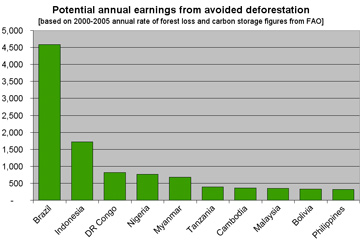World Bank offers $300M for forest conservation, emissions reductions
World Bank offers $300M for forest conservation, emissions reductions
mongabay.com
October 15, 2007
Tropical forest countries will be eligible for payments for preventing deforestation under a program unveiled last week by the World Bank.
Called the Forest Carbon Partnership Facility (FCPF), the fund will initially provide $300 million to finance emissions reductions through forest conservation initiatives. The World Bank said the program will “help developing countries build the technical, regulatory, and sustainable forestry capacity to reduce emissions from deforestation and degradation.”
Deforestation and forest degradation currently accounts for about 20 percent of greenhouse gas emissions resulting from human activities, according to the U.N.

Potential earnings from avoided deforestation, based on annual rate of forest loss in selected countries from 2000 to 2005 and average carbon storage values from FAO. Carbon is assumed to be priced at $5 per metric ton of carbon dioxide equivalent. Note: these figures only include emissions from deforestation, not land degradation. By some estimates, Indonesia’s annual emissions may be higher than those of Brazil due to degradation of carbon-rich peatlands. |
The World Bank said that 20 countries have already expressed interest in the fund. Avoided deforestation is expected to be part of a post-2012 global agreement on greenhouse gas emissions.
Cleaner energy fund for developing countries
The World Bank also announced a new Carbon Partnership Facility (CPF) to promote the use cleaner technologies in developing countries, especially in the energy sector.
“Developing countries will earn money and obtain clean technology in exchange for the greenhouse gas emission reductions they will sell to developed countries,” said World Bank Group President, Robert B. Zoellick. “Both facilities [FCPF and CPF] will pilot ways to ratchet up the fight against climate change by adopting a larger-scale, longer-term approach to greenhouse gas emission reductions. They will also build on the World Bank Group’s traditional relationship with developing countries, and the new relationships it has forged over the past decade as a pioneer in carbon finance.”
The carbon offset market grew from $10.8 billion in 2005 to 30.1 billion in 2006.
Related articles
Carbon for forests will help Aceh recover from war, tsunami
(9/18/2007) Carbon credits through forest conservation will play an important role in Aceh’s recovery from decades of civil war and the devastating 2004 tsunami, which left more than 167,000 people dead and 500,000 homeless in the Indonesia province, said Aceh governor Irwandi Jusuf in meeting in San Francisco.
Rainforest countries form pact to push global warming solutions
(9/13/2007) Eight tropical countries containing 80 percent of the world’s remaining tropical forest cover have formed an alliance to have forest conservation included in a post-Kyoto agreement on climate change, reports the Financial Times. The “Forestry Eight”, as the group is called, includes Brazil, Malaysia, Papua New Guinea, Gabon, Cameroon, Costa Rica, Congo and Indonesia.
Avoided deforestation could help fight third world poverty under global warming pact
An avoided deforestation strategy for mitigating climate change could mean billions for world’s poorest countries while preserving biodiversity and ecosystem services. Avoided deforestation will be a hot point of discussion at next week’s climate meeting in Nairobi, Kenya. Already a coalition of 15 rainforest nations[1] have proposed a plan whereby industrialized nations would pay them to protect their forests to offset greenhouse gas emissions. Meanwhile, last month Brazil — which has the world’s largest extent of tropical rainforests and the world’s highest rate of forest loss — said it will promote a similar initiative at the talks. At stake: potentially billions of dollars for developing countries and the future of the world’s climate.







